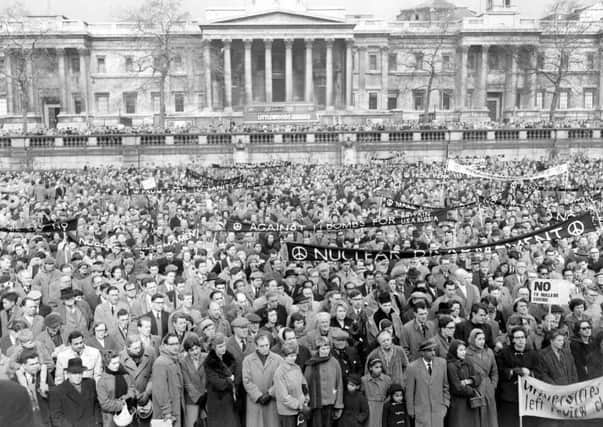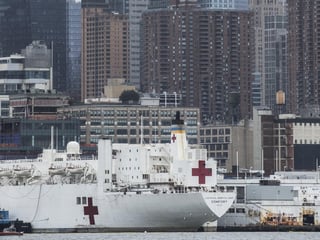Why Glasgow could be the last place in Scotland to emerge from lockdown – Professor Hugh Pennington


The Covid-19 lockdown cannot go on for ever. Its economic consequences are already close to catastrophic. But, on the other hand, the virus cannot be allowed to run free.
Politicians shelter behind the scientists, but the mantra “follow the science” is unhelpful, because there is no such straightforward thing for a new coronavirus; the scientific evidence is still very patchy and very incomplete, its utility being best summed up by the Sam Goldwyn quote, “Making predictions is difficult, particularly about the future”.
Advertisement
Hide AdAdvertisement
Hide AdFor many years, pandemic planning has concentrated on influenza and how we should respond to the evolution and spread of a new virus with high virulence, like the one that caused the “Spanish” flu pandemic in 1918-19, which killed many more than the enormous number who died from machine guns, poison gas and shells in the First World War.
There are historical parallels with today. The Prime Minister, Lloyd George, was infected with it (as well as the US President, Woodrow Wilson) at the time of the WW1 peace conference. There was vigorous debate about the effectiveness of wearing surgical masks. In the US, they were made compulsory in San Francisco.
At the end of the day, the evidence that they worked remained uncertain, however. Some unscrupulous individuals peddled remedies and kitchen-sink vaccines that were all totally useless. And many health care workers were infected.
Predictions about Covid-19 are still influenced by influenza. In 1918-19, there were three waves of infection. The 1957-58 Asian flu outbreak, by far the most lethal pandemic since Spanish flu, killed at least 20,000 in the UK with two main waves, one in the autumn and one at around Hogmanay.
US election affected?
Social distancing wasn’t contemplated and public gatherings went on without interruption. CND marched for the first time from Hyde Park to Aldermaston. There were no influenza press conferences or daily, or even weekly, bulletins about the progress of the virus.
If we return to normal, will Covid-19 behave in the same way, with a second wave, or will it behave like Sars, for which control measures eventually worked well enough to prevent this, despite the vast majority of people still having no immunity and so being fully susceptible?
Will Covid-19 persist and become a seasonal virus, like Asian flu, which went on killing people every winter until it was supplanted by Hong Kong flu in 1968 or, again, will it go the way of Sars, which disappeared in 2003 and hasn’t come back?
How soon will it take to make and manufacture a safe and effective vaccine? In 1957-58 the virus had run out of steam before a programme was started, and it is worth remembering the bitter experience of the 1976 massive influenza immunisation programme in response to a new virus in the US, which had to be stopped because of rare and unpredicted side effects; these events may well have played a part in the presidential election when President Gerald Ford, who was pictured receiving his flu jab, lost to Jimmy Carter.
Advertisement
Hide AdAdvertisement
Hide AdCan schools be opened at the beginning of any lockdown easing? The evidence that they act as incubators of infection during a flu pandemic is very strong. In 1957, the virus had arrived in the UK at about the start of school holiday time, but didn’t take off on its killing spree until just after the schools had gone back. However, the evidence for Covid-19 is far less compelling.
Glasgow the last place out of lockdown?
The answer to all these questions is that nobody knows. My guess is that for the moment the precautionary principle will rule and that nothing will change. It is ironic to note that the European Union is particularly keen on this principle. Apart from infecting them, it is amazing to contemplate the effect that a tiny and brainless virus can have on politicians.
It is reasonable to guess that relaxing lockdown will not happen all at once. It may be possible to do it on a geographical as well as a functional basis.
In Scotland, places like Orkney and the Western Isles may be the first to escape. Glasgow and its environs may well be the last.
An essential prerequisite from the infection control point of view – once the number of new cases had fallen to a significant degree, thus allowing the start of the exit from lockdown – would be testing on a scale that would permit everyone even with the mildest symptoms to be evaluated as well as their contacts.
Without doing this, there would still be the risk that the virus might be creeping along under the radar and waiting for a ‘super-spreader’ event like a big public function to get going again.
It is too early to tell whether antibody tests will turn out to be the promised “game-changer”. The most important thing just now is to significantly reduce virus transmission by social distancing, and, as soon as possible, knock the virus out by testing and contact-tracing.
Hugh Pennington is emeritus professor of bacteriology at the University of Aberdeen
A message from the Editor:
Advertisement
Hide AdAdvertisement
Hide AdThank you for reading this article on our website. While I have your attention, I also have an important request to make of you.
With the coronavirus lockdown having a major impact on many of our advertisers - and consequently the revenue we receive - we are more reliant than ever on you taking out a digital subscription.
Subscribe to scotsman.com and enjoy unlimited access to Scottish news and information online and on our app. With a digital subscription, you can read more than 5 articles, see fewer ads, enjoy faster load times, and get access to exclusive newsletters and content. Visit www.scotsman.com/subscriptions now to sign up.
Our journalism costs money and we rely on advertising, print and digital revenues to help to support them. By supporting us, we are able to support you in providing trusted, fact-checked content for this website.
Frank O’Donnell
Editorial Director
Comments
Want to join the conversation? Please or to comment on this article.
